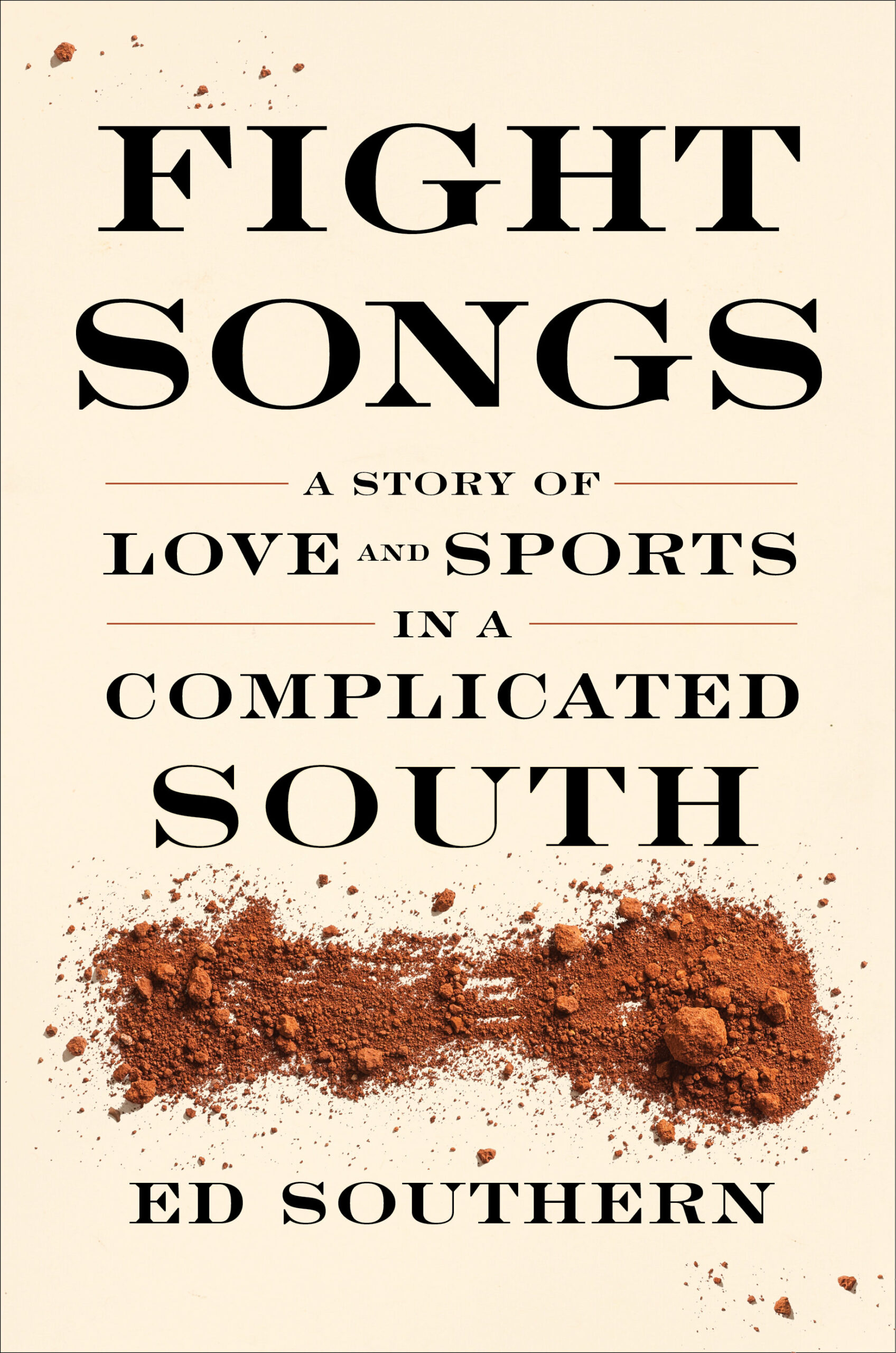You know that “oh whatever” feeling you get at the library when you’re trying to find a book to read but nothing’s grabbing your attention so you just snatch some random book and hope you like it but figure you won’t.
Yesterday I had this experience when I browsed through the section of sports books when the title Fight Songs caught my eye. I figured well some light reading about college fight songs could be some mindless mind candy, maybe.
Little did I know until I opened randomly to the first page of a chapter that this book, Fight Songs: A Story of Love and Sports in a Complicated South by Ed Southern, was about Wake Forest football, which if you’ve been reading any of my stuff know that I’m pretty into the Demon Deacons and lose myself during the Fall hoping we all meet for a national championship and crush Alabama and then celebrate together as we should have after the Pitt ACC championship game last Fall had those assholes not started faking injuries to slow down our delayed read pass option mesh offense that thrived on momentum.
Seeing that first page, I started diving into the text about something I’ve always wondered, whether the Steely Dan song reference to “Deacon Blues” was about the sorrowful feelings we’re all too familiar with because, until recently, Wake football lost a lot for countless years.
So I read the chapter and said “holy shit” this whole book is about Wake Forest football written by a Wake Forest grad who adores Wake football and he’s got this wife who went to Alabama and they go to Roll Tide tailgates and demolitions over SEC opponents. There’s really only one to-do item on my bucket list: going to see the Crimson Tide crack up some unfortunate squad in Tuscaloosa, Alabama.
But while football obsession wonderment and analysis are at the core of this book, there’s so much more texture to it that’s woven together with astounding writing adroitness; it’s so impressive in so many pure writing ways not the least of which is the author’s millions of miles of depth into centuries of history in the South especially North Carolina, South Carolina, and Alabama.
The book weaves a psychological exploration of the South and its misgivings and guilt about slavery leading all the way through the 2020 George Floyd riots and all the weirdness surrounding whether college football should be played during that Fall of 2020 with the country ablaze in pandemicnoia, race riots, and burning of statues of men known to support slavery.
Yes, a sports book this is, but massively more and frankly a work so powerful that all of us should be proud one of our own, a Wake Forest graduate, pulled off a book of this importance and emotional honesty – with the skill of a master writing practitioner.
So honest and so resonant for me in fact, that he talks about growing up being unathletic yet burned to be a star athlete he never had the natural skill to become.
“I was a handful as a teenager, not in the fun, up-for-anything, never-know-what-I-might-do kind of way,” he writes. “I was a handful in the exhausting, undiagnosed-mental-illness kind of way. Back then and there “depression” was what had toughened up your grandparents so they could whip the Nazis, and “anxiety” was another word for nervousness, which was another word for weakness. I know now mine was a family heirloom, handed down through the generations. I did not deal with it well…I thoroughly loathed myself.”
The poignancy of this to me is two-fold. My life’s greatest complication is the opposite of his. As a kid, I was an exceptional natural athlete who had no problem becoming quite literally a star in football, basketball, and baseball all the way through high school.
My demons were that I wasn’t the smartest guy in my high school and well down the totem poll amid all the intellectually gift students wall to wall within the Wake Forest community.
This author wrote for the Old Gold & Black school newspaper and no doubt excelled with striking flair stringing slick sentences together. I wrote a few articles for the paper that were massively edited and figured I wasn’t good enough to keep trying. No confidence. He’s gone on to write this big-time book and clearly is a well-established author with no doubt more revered works to come.
I’ve been spending my entire college career and some 35 years beyond trying to be a well-respected writer yet feel like Ed Southern felt about his athletic ability and in both cases, we were both probably self-aware: we aren’t especially talented; he was not at sports, me not at writing.
Tough as this has been to endure for, yes, almost 40 years, it has caused me to fall into bouts of scary self-doubt and mental illness conditions more times than I would ever want to specify.
So this person Ed Southern and I have some interesting coincidences running between us which becomes even richer when you consider I will no doubt want to have a soda with him at a Wake Forest football game in September to talk about all these cool things, especially how much I enjoyed reading his kick-ass book. It won’t be creepy, Ed. I’m reasonably cool.
I could have chosen 25 excerpts to show you what makes this book so stellar but to keep this under 50,000 words I’ll tell you about a few beginning with him describing what it’s like when Wake Forest wins – which is quite infrequent and which I am sure all of you can relate.
“When Wake did win, though, oh the joy. Most wins were upsets and felt like a triumph of right over might, of the cosmos settling on justice for once. We were smug that Wake at least ran its program the right way, well within every rule, because how on earth could they run it the wrong way and still lose so often?”
Losing so often – don’t we all know this — has been the central narrative for the Wake basketball team for decades with the exception of last year’s squad that seemed to be turning a corner but no telling if this trend will stick; probably won’t.
“Wake basketball is like your dad who’s fallen apart after the divorce, can’t ever get his shit together gets drunk and gets into a fight and gets thrown in jail and so loses his job. He has to mortgage the old family home to pay the fine and fees, and then the bank repossesses it, forcing him into his buddy’s trailer at the unpaved ass-end of Tobacco Road.”
Every one of you knows the Wake football narrative has been much more gratifying these past few years and brought immense joy to all of us including Southern and me.
Wake football, meanwhile, is the mom who went back to school and got her degree, found a steady and good-paying job in IT, and met a nice guy – a lawyer! – and remarried, and lives now in one of the new subdivisions with a swimming pool and tennis courts, just outside the city limits, where the taxes are lower. Whew, that might have been better than therapy.
Southern’s quirky and subtle wit literally makes you smile several times in this book. Perfect timing, exquisite phrasing with an unconventional tendency that breaks many “don’t write repetitiously” writing rules by starting several paragraphs with the same wording: “I write all these words because…”
Never in my life have I read a book where the writer keeps doing this wrong writing thing and never will I forget this brash way of doing what you want to do with the openings to your chapters, so editors get lost.
Why Football is Great
A central question of the entire book is why football in the South, and in all of America for that matter, is so incomprehensively popular, drawing religious-like cults of 100,000 people plus every Fall every Saturday to watch the Crimson Tide, and how does this tie in with American values, priorities, and race relations. The author asks a friend of his, a Wake professor who played football, what the allure is.
“I loved it,” said Eric G.Wilson. “I loved how the football smelled. I loved when you put the mouthpiece in your mouth and it’s hot and boiling and you bite down on it. It’s such a visceral game. I walk into a locker room and it’s intoxicating.
“What I liked best, though, was the first hit,” he said. “Because you’re just nervous as fuck. I swear to God, it’s a cliche but it’s true, it’s like the first time you get tackled, you’re like, YEAH, and then you want it, you want more. I can get into all the gladiatorial, homoerotic stuff, but I don’t think it’s about that. It just feels good to hit. It’s like getting a good hit on a softball, and how good it feels when hit just right. The same thing with a football hit, man, you know – you bang into that safety, and he’s going down. You may go down, too, but you ran over that fucker.”
Does this arouse you as much as it does me?
Roll Tide Tailgates
From a football perspective, this book is not totally about Wake Forest which makes it even more rich and amazing. He marries into a family of Alabama Crimson Tide rapid loyalists. Not only does he go to the Roll Ride rampages, he admits he roots for them even though without any doubt if the two teams played he’d be all about his Demon Deacons and this is one reason I want to meet him: he’s like me, true in his heart a Wake Forest football guy till he’s into his dirt nap for all of through eternity and beyond.
You have heard, we all have heard, about the football tailgates when the Crimson Tide play their home games. One day I will get there, maybe with Ed (I hope with Ed) because I like what I see in the picture he paints of that scene:
We passed by tent after tent overflowing with sundresses, Vineyard Vines, and floppy hair; by countless cornhole boards, flags, and pennants; by Denny Chimes and the handprints of team captains past; back down to the stadium and the Walk of Champions, taking photos of the new-to-use Nick Saban statue next to the others, cheering Saban and his team as they got off the busses.
At one of these events I’ll be sure to memorize before going the Alabama football fight song he writes about:
The words to most fight songs are rosy platitudes about the virtues of the home team and school and generic urgings to play hard and win through. “O Here’s to Wake Forest” compares the school to a glass of fine wine, then declares our intent to “sing our hymn” and “herald the story.”
“Yea, Alabama” commands its team to “teach the Bulldogs to behave” and “send the Yellow Jackets to a watery grave.”
As if all this irrational exuberance wasn’t enough for me to want to actually take a walk with this guy in Reynolda Gardens (just kidding I’m married and so is he), this book raises the stakes when the author describes his meeting during Covid-19 with everybody’s favorite professor, Ed Wilson, who is known as “Mr. Wake Forest.”
Southern, who had been one of Wilson’s students as an undergraduate, talked about the importance of learning and the professor quoted the words of a character named Merlin in a book by T.H. White titled “The Sword and the Stone.”
Listen to Merlin.
“The best thing is to learn something. That is the only thing that never fails. You may grow old and trembling…you may lie awake at night…you may miss your only love, you may see the world about you devastated by evil lunatics…There is only one thing then – to learn. That is the only thing which the mind can never exhaust, never alienate, never be tortured by, never fear or distrust, and never dream of regretting.”
Learning was the very essence of Wake Forest – at least for me. Whatever I knew before I went there was only incidental to what I learned while there and it was mostly about how to learn the joy of learning and the value of learning.
Had I not learned to love learning at Wake Forest I probably wouldn’t have been at the library yesterday hoping to grab a book that would teach me something new that would enrich my life.
You’ll be uplifted to learn that despite his difficulties in childhood, Ed Southern has overcome all that and is in a good place in his life writing that he “fought his bullies, my worst self, and my demons, and I wake every morning unafraid to fight them again. I mean I just don’t have it in me to quit…I have class, and I know I do. I mean that I am happy now.”
And so am I.
Author Profile

-
Sammy Sportface, a sports blogger, galvanizes, inspires, and amuses The Baby Boomer Brotherhood. And you can learn about his vision and join this group's Facebook page here:
Sammy Sportface Has a Vision -- Check It Out
Sammy Sportface -- The Baby Boomer Brotherhood Blog -- Facebook Page
Latest entries
 BonusApril 15, 2024Dancing in the Meadowlands – Then Darting Away
BonusApril 15, 2024Dancing in the Meadowlands – Then Darting Away BonusApril 13, 2024Back in Bernardsville: You Can Go Home Again
BonusApril 13, 2024Back in Bernardsville: You Can Go Home Again BonusApril 12, 2024Jersey – His Hometown From A Lifetime Ago
BonusApril 12, 2024Jersey – His Hometown From A Lifetime Ago BonusApril 10, 2024Sportface Whizzing Up Freeway to Gotham City
BonusApril 10, 2024Sportface Whizzing Up Freeway to Gotham City

